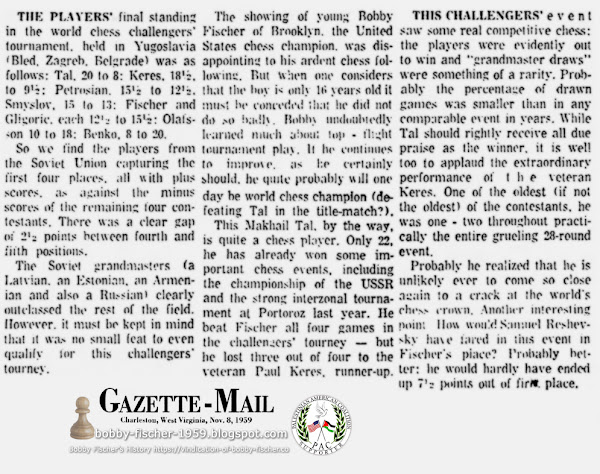Sunday Gazette-Mail Charleston, West Virginia Sunday, November 08, 1959
THE PLAYERS' final standing in the world chess challengers' tournament, held in Yugoslavia (Bled, Zagreb, Belgrade) was as follows: Tal 20 to 8: Keres, 18½ to 9½: Petrosian, 15½ to 12½: Smyslov, 15 to 13: Fischer and Gligoric, each 12½ to 15½: Olafsson 10 to 18: Benko, 8 to 20.
So we find the players from the Soviet Union capturing the first four places, all with plus scores, as against four contestants. There was a clear gap of 2½ points between fourth and fifth positions.
The Soviet grand masters (a Latvian, an Estonian, an Armenian and also a Russian clearly outclassed the rest of the field. However, it must be kept in mind that it was no small feat to even qualify for this challengers' tourney.
The showing of young Bobby Fischer of Brooklyn, the United States chess champion, was disappointing to his ardent chess following. But when one considers that the boy is only 16 years old it must be conceded that he did not do so badly. Bobby undoubtedly learned much about top-flight tournament play. If he continues to improve, as he certainly should, he quite probably will one day be world chess champion (defeating Tal in the title-match?)
This Mikhail Tal, by the way, is quite a chess player. Only 22, he has already won some important chess events, including the championship of the USSR and the strong interzonal tournament at Portoroz last year. He beat Fischer all four games in the challengers' tourney — but he lost three out of four to the veteran Paul Keres, runner-up.
THIS CHALLENGERS' event saw some real competitive chess: the players were evidently out to win and “grandmaster draws” were something of a rarity. Probably the percentage of drawn games was smaller than in any comparable event in years. While Tal should rightly receive all due praise as the winner, it is well too to applaud the extraordinary performance of the veteran Keres. One of the oldest (if not the oldest) of the contestants, he was one - two throughout practically the entire grueling 28-round event.
Probably he realized that he is unlikely ever to come so close again to a crack at the world's chess crown. Another interesting point. How would Samuel Reshevsky have fared in this event in Fischer's place? Probably better: he would hardly have ended up 7½ points out of first place.























